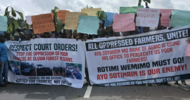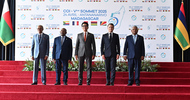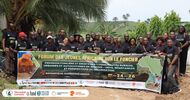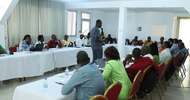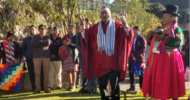UNECA | 1 November 2021
Conference on Land Policy in Africa opens with calls for pro-poor land policies, equal access, and ownership
Conference on Land Policy in Africa opens with calls for pro-poor land policies, equal access, and ownership
Abidjan, 1 November 2021 - The 2021 Conference on Land Policy in Africa opened Monday with a resounding call for African countries to develop pro-poor land policies and inclusive land tenure rights, particularly for women and youth.
"We need commitment at the country and regional levels to ensure equity," Rwandan Environment Minister Jeanne D'Arc Mujawamariya told delegates at the hybrid event, held partially in Rwanda. Mujawamariya said that "anything related to land needs strong political will, people buy-in, and close collaboration."
The minister described how climate change has raised the risk of deforestation and land degradation and called for innovation in the implementation of land reforms and services.
"We also have the Covid-19 pandemic," she added, "which has slowed the continent's economic progress. The land is part of our collective history, and we must protect it for future generations."
The theme of this year's conference is "Land governance for safeguarding art, culture, and heritage towards the Africa we want." This is in keeping with the African Union's declaration of 2021 as the year of "Arts, Culture, and Heritage: Levers for Building the Africa We Want," in line with Agenda 2063.
Via a representative, Dr. Beth Dunford, African Development Bank Vice President for Agriculture, Human and Social Development, made a strong argument for equitable access, use, and ownership by all community members, particularly women and the youth.
Represented by Aissa Sarr Toure, Country Manager for Rwanda, Dunford said: "Land is a key input to food production and a major source of capital for the poor. In any program on land reform and women's land rights in Africa, the importance of land and its unequal distribution between male and female should be given greater consideration."
"We in the Bank are very resolute on this in our overall programming and project implementation. We shall continue supporting our member states in national visioning and the imperative for inclusive and sustainable development," she added.
Mama Keita, Director, Sub-Regional Office for East Africa at the United Nations Economic Commission for Africa, said creatives could help make technical land reform information more accessible.
"Land governance information can be rendered in music, film, visual arts, short stories and animation, and presented in different African languages for better reach," said Keita.
She added: "Traditional institutions and alternative dispute resolution mechanisms are being utilized, alongside statutory law, to address disputes. But more still needs to be done."
Ambassador Josefa Sacko, Commissioner for Agriculture, Rural Development, Blue Economic and Sustainable Development at the African Union Commission, reminded participants that competition for land due to climate change is fueling conflict in Africa.
"In Southern Africa, the unresolved historical legacy of colonial land alienation underlies the risks of social and political conflict. In recent years, a surge in the purchase of African land by foreign companies and governments to grow food and other crops for export has also set alarm bells ringing on and off the continent."
Sharing his country’s experience on land challenges and the innovations required, Sakombi Molendo, Minister for Land Affairs, Democratic Republic of Congo, said: "We found out that 80% of cases before courts and tribunals were land-based. We initiated reforms to change this situation. In two years, we have been successful in drafting new land policies that would soon be tendered to the government for deliberation."
The African Land Policy Centre, a collaborative project of the African Union Commission, the United Nations Economic Commission, and the African Development Bank, hosts the Conference on Land Policy in Africa every two years. The conference brings together African policymakers, academics, civil society leaders, and the private sector and international agencies to discuss the future of land policy in Africa.





